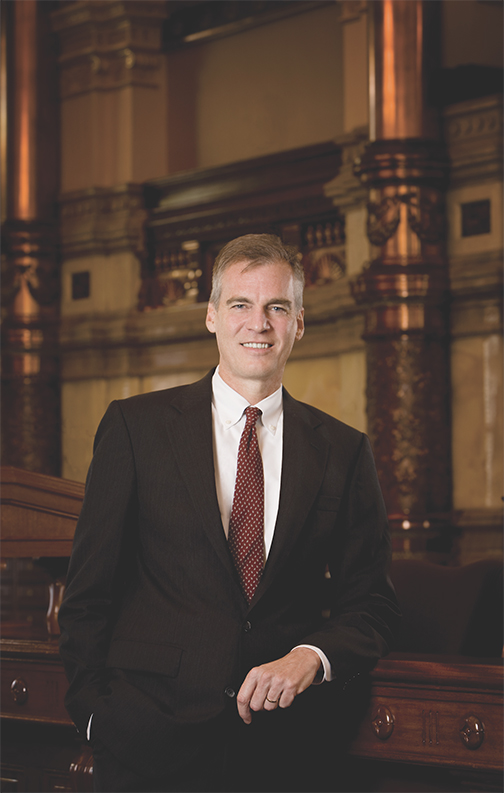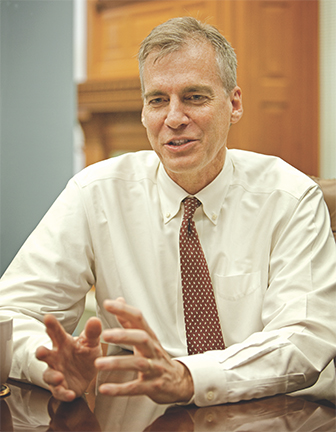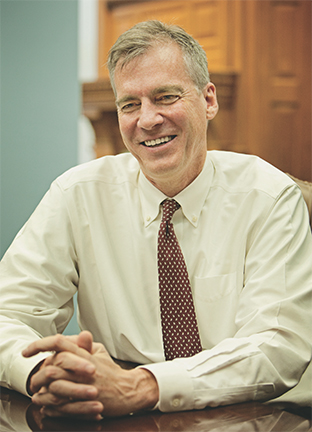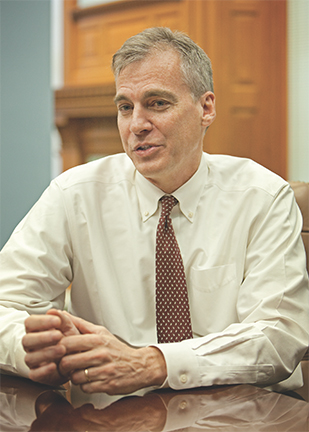
the East Wing of the capitol building in Topeka. Completed in 1873,
decorated in 1885 at a cost of nearly $141,000 and renovated in 2006,
the chamber is known as one of the most ornate in the nation.
Features include windows imported from France; marble from Italy,
Mexico, Belgium and Tennessee; and 28 bronze and copper columns,
all handcast with designs of morning glories and roses.
Mark Parkinson '80 took over
the Kansas gubernatorial reigns from Kathleen Sebelius on April
28, the day Sebelius gained Senate confirmation as the 21st U.S. Secretary of Health and Human Services. Parkinson is Kansas’
45th governor.
Now in his fifth month in office, this Wichita State secondary education graduate has targeted economics, energy and education, a triple-E trio of difficult and interwoven issues.
Parkinson, a native Wichitan, successful businessman, lawyer and former legislator, has a reputation as being a deliberative man of action — just the person, many believe, to handle the challenges facing Kansas today.
“Mark is smart and energetic and committed to the brightest possible future for the state he loves,” Secretary Sebelius says. “He was a great partner in the campaign and for the first 16 months of my second term, and even in these difficult economic times for Kansas, he is well prepared to lead and make the tough decisions required to continue the progress we have made.”
“Our university’s tagline is ‘Thinkers, Doers, Movers and Shockers,’” Wichita State University President Don Beggs says. “I think he’s a person who fits that perfectly.”
Kansas Treasurer Dennis McKinney ’82/84 says, “Governor Parkinson is a hard-working, sensible leader. His willingness to look at a situation from every different angle and come up with solutions truly serves Kansans well.”
And Alan Conroy ’79/79, who directs the Kansas legislative research department, says, “Governor Parkinson is a person of integrity. His word meets the gold standard of following through on commitments and honoring those commitments.” Parkinson himself simply says he’s a “problem-solver” — with an eye to the future.
Points of Information
Parkinson takes off his suit jacket and settles into a chair in the Governor’s Office conference room to talk. Outside the Statehouse, the September morning is overcast, but pleasant. With myriad concerns vying for his attention, the governor remains remarkably focused on his administration’s priorities. “I was sworn in at a time when there were some very difficult issues right off the bat,” he says. “Our priorities are to steer the state government through the worst recession we’ve been in since the 1930s, to continue the progress we’ve made on energy and to continue to work on education.”
He is described as penetratingly intelligent by all but his staunchest political opponents, many of whom he riled in 2006 by switching from the Republican to the Democratic Party to be Sebelius’ running mate in her re-election campaign. Nonetheless, Parkinson, who served in the Kansas House of Representatives from 1991 to 1992, in the Kansas Senate from 1993 to 1997 and as Kansas Republican Party chairman from 1999 to 2003, is known as a person who can bridge party lines.
That is something he traces back, in part, to a WSU classroom. “I was a political science major at WSU,” he says, “but consistent with my philosophy that you also need to have a trade, I was in the College of Education. Dr. (John) Millett said something once in class that has stuck with me.

state legislators, members of the Cabinet and representatives
from AT&T, Best Phone and the United Way, speaks to media
and other interested parties Sept. 10 at the Statehouse to raise
awareness about Lifeline and Link-Up, two programs that help
low-income Kansans with phone services.
He drew a line across the chalkboard, a long line, and asked, ‘If at the left side of this line is anarchy and at the right side is dictatorship, where do the Republican and Democratic parties fit?’ He made the case persuasively that the Republican and Democratic parties are both in the middle of that long line, and not very far apart.
“We live in a society right now where Republicans and Democrats believe that they are far apart on every single issue. So they are constantly fighting and often not getting anything done. When you look at a world perspective, you realize how close the parties are to each other. That illustration has been helpful in the effort I’ve undertaken to work with people from both parties.”
Parkinson’s earliest foray into politics came in 1978, when he ran against a long-seated incumbent for the state legislature.
He lost by a narrow margin. His run for office was sandwiched between two years of study at WSU, where he was a standout debater. “I was close to our debate coach John Schunk,” the governor says. “When you’re on the debate team at the national level like we were, it’s very nerdy, but it’s just as much a commitment as being on the basketball team. I mean, you’re spending 30 hours a week preparing for and going to debate tournaments.”
John Carmichael ’80, now of the law firm Conlee Schmidt & Emerson in Wichita, was Parkinson’s first WSU debate partner in 1977. “I had the happy privilege of traveling with Mark and John (Schunk),” Carmichael says. “Mark was undoubtedly the power on our team. He is one of the brightest people I have ever met in my life. And he’s a decent guy to watch football with, even have a beer with.” He adds with a laugh, “In fact, there may have been several beers, which were not, I assure you, charged to the state of Kansas.”
Brian Hufford ’80, a partner with the New York City-based law firm of Pomerantz Haudek Block & Grossman, was Parkinson’s second debate partner in 1979. “Mark is very smart, very open-minded,” Hufford says. “He’s able to evaluate issues from all sides and balance out competing factors. As accomplished as he is, he’s not pretentious. He’s down-to-earth — a regular guy.”
Parkinson, who graduated from Wichita Heights High School, went on to graduate summa cum laude from WSU. In 1984, he graduated first in his class from the University of Kansas School of Law. “I consciously set out to do that,” he says. “I had had what I perceived as some failures. The year that I didn’t debate at WSU, what would have been my junior year, I ran for the state legislature and lost by 36 votes.
In hindsight, thank goodness that I lost. My life would have been incredibly different. I viewed it as a great experience, but it was kind of a close-but-no-cigar thing. … I had this complex that I was coming close to things but not quite achieving them. So in law school, I never would have admitted it before because I had no idea if it was achievable, but my goal was to be first.”
Building the Case

Parkinson met his wife, Stacy, also a lawyer, at KU. They have three children, now 20, 17 and 15. The governor entered private practice and formed his own law firm in 1986. A decade later, he and Stacy became entrepreneurs, developing elder-care facilities that have received national recognition for their design.
“We built little cities inside of them so that they have restaurants, a church, a hair salon and a movie theater that is always named the Majestic,” Parkinson reports. The theaters are the namesake of the one started by his great-grandfather in Fort Scott, Kan. “Stacy and I always had multiple activities,” Parkinson says. “We practiced law, were in business. We’re well suited to multitasking.”
The Parkinsons are also committed community activists. As one recent example, they co-chaired the Sunflower House Capital Campaign that raised $4.2 million to support the child abuse assistance agency. Since becoming governor, Parkinson has been decidedly focused on the economics-energy-education triptych of issues, and he’s pleased about the progress being made on them.

“In a logical and reasonable way, we steered our state budget through very difficult times,” he says. “We didn’t have an extended legislative session; we didn’t have to call a special session; we didn’t have to raise taxes; we didn’t have the sort of cantankerous debate we’ve seen in other states. That’s the first thing I’m proud of. And that credit goes to all the legislators, as well.” On the energy front, he sees Kansas as becoming ever better positioned to be a leader in all forms of energy. Under his leadership, for instance, wind farms have tripled in the state.
Regarding education, higher education in particular, he is making the case for change. In an Aug. 25 speech to the Kansas Board of Regents, he set the academic owl of Minerva aflutter by using the popular US News and World Report university rankings to propose that the Regents develop a 10-year plan that would lead to, among other things, at least one national university in the top 50, a second university ranked in the top 100 and no Kansas institution in the fourth tier (where WSU currently is listed).
“The speech covers some uncomfortable topics,” Parkinson says, “but they’re topics somebody needed to start discussing. We need to start spending more time talking about the future of our universities than the rankings of our basketball teams. Whether people agree or disagree with the statements I made, at least people are talking about them. If we can get students situated in the university they can succeed in, we will not only improve their lives but improve the state.”

WSU President Beggs says, “From my standpoint, I’m very pleased that the governor’s comments to the Regents have led to real discussion about higher education. I appreciate his directness and willingness to discuss issues. He cares about Wichita State, and he cares about higher education.” One of several potential WSU-initiatives that Parkinson and Beggs have discussed is the creation of a dental school. Beyond that, Parkinson says, “I think the up-side potential for Wichita State is virtually limitless.”
The governor’s own experiences at WSU have served him well. “I really learned how to think, how to write, how to speak,” he says. “All the skills that I have today matured at wsu. Wichita State is where I learned speaking skills through debate, where I developed a somewhat international perspective because I participated in Model Nations — and I study-taught, which all teachers know is a tremendous experience because you have to deal with about 25 different things going on at one time. You have to prioritize what you’re going to do next.”
Parkinson is looking forward to getting back into private life after his term ends in 2010. Yet a number of people who know him well — his Shocker debate partners are two — hold out hope that he will reconsider and stay on in public service.
Whatever his next moves are, one thing he will be attending to is Shocker basketball.
That’s right. He’s a huge fan, has been since a kid growing up in Wichita. Back in 1981 when WSU played KU in the Sweet Sixteen, he wanted to go, but couldn’t. So he had a friend (and KU fan) who lived in New Orleans tune in to the game on the radio, phone him up and let him listen.
Suspiciously enough, the radio fell off the table it was sitting on with 20 seconds left to go in the game. To this day, Parkinson says, all he ever has to say to get a rise out of either his old friend or his wife, another avid KU fan, is “sixty-six to sixty-five.”
That’s our Shocker governor.





